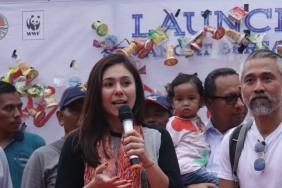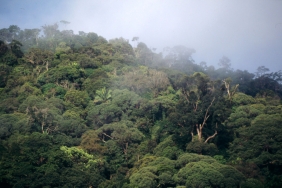WWF SUPPORTS ORANGUTAN SRAK 2019-2029
Jakarta, August 19, 2019 - Utilizing the momentum of International Orangutan Day, which falls on August 19, WWF-Indonesia affirms its commitment to fully support the 2019-2029 Orangutan Conservation Strategy and Action Plan (SRAK) launched by the Ministry of Environment and Forestry on Monday, August 12, 2019.
The Orangutan SRAK 2019-2029 is the main foundation for WWF-Indonesia to carry out its conservation work in five orangutan habitat areas namely Hulu Kapuas Landscape West Kalimantan, Muller-Schwaner-Arabela Landscape West Kalimantan - Central Kalimantan, Sebangau Katingan Landscape Central Kalimantan, Kayan Landscape North Kalimantan, and Northern Sumatra Landscape North Sumatra.
On the same occasion, Ir. Wiratno M.Sc, Director General of KSDAE, Ministry of Environment and Forestry, conveyed his message that "Indonesia as a country that has Bornean and Sumatran orangutans invites all parties to increase awareness and work together continuously in the conservation of orangutans and their habitat. With greater involvement from all sectors of the Central Government, Regional Governments, NGOs, Orangutan Rehabilitation Centers, Researchers, Private Sector, Community Leaders, Traditional Leaders and Religious Leaders together and work hand in hand to support various orangutan conservation efforts in Indonesia. The integration of these efforts is expected to be able to save orangutans and build mutual awareness of the importance of orangutan and habitat conservation."
International Orangutan Day Commemoration
Indonesia is home to three orangutan sub-species: the Bornean orangutan (Pongo pygmaeus) in Borneo, the Sumatran orangutan (Pongo abelii) and the Tapanuli orangutan (Pongo tapanuliensis) in Sumatra. Unfortunately, orangutans are still on the International Union for the Conservation of Nature (IUCN, 2017) red list of critically endangered taxa. Based on the Population and Habitat Viability Assessment (PHVA, 2017), Tapanuli orangutans rank at the bottom with only 800 individuals, Sumatran orangutans with 13,710 individuals, and Bornean orangutans with a total of 45,590 individuals.
In response to this, in order to commemorate International Orangutan Day 2019, WWF-Indonesia held various public campaigns. WWF-Indonesia Hulu Kapuas Landscape together with TFCA Kalimantan, Forclimate-FC, Art Community (PAC). And Scouts Kwarcab Kapuas Hulu, West Kalimantan designed an action titled 'Collaboration Campaign for Orangutans' consisting of radio talk shows, school visits and art performances. WWF-Indonesia Northern Sumatra Landscape organized an 'Orangutan Campaign Poster Competition' with two major themes: "Take action now, save orangutans from extinction" and "Forests lost without Orangutans, Earth lost without forests". This activity was also supported by the SRJS Program, Earth Hour Aceh Community, and a group of painting artists in Banda Aceh. Meanwhile, WWF-Indonesia Mueller-Schwaner-Arabela Landscape together with Earth Hour Pontianak Community, Yayasan Titian Lestari, and Yayasan Planet Indonesia organized a photobooth challenge, conservation-themed stand-up comedy, video screening, and held a "Save Orangutans from Extinction" letter configuration in the car free day area to increase public enthusiasm.
Lukas Laksono Adhyakso, Director of WWF-Indonesia's Conservation Program, explained, "The public campaign is one of the important components in the 2019-2029 Orangutan SRAK as the 'Communication and Public Awareness Strategy and Program for Orangutan Conservation.' Therefore, WWF-Indonesia in addition to working in the Insitu area to maintain populations in the area, monitoring, and overseeing policies that are implemented and needed, also plays a role in educating the public as one of the efforts to succeed in achieving the national targets of the 2019-2029 Orangutan SRAK."
The Challenges of Orangutan and Habitat Conservation
The Challenges of Orangutan and Habitat Conservation
We have just celebrated the 74th Independence Day of the Republic of Indonesia, while at the same time the nation is struggling to fight forest and land fires (karhutla) that occurred in parts of Sumatra and Kalimantan. Forest and land fires have always posed a serious threat to pockets of protected animal habitat and biodiversity, especially orangutans. In addition, orangutan conservation often fails due to the development of forest resources for economic development, which has negative impacts such as deforestation, destruction, and forest fires. This condition is due to forest governance that has not fully considered the principles of ecology and conservation of natural resources and ecosystems.
Therefore, WWF-Indonesia expresses its readiness to become a government partner and actively invites other stakeholders to carry out and oversee the implementation of the 2019-2029 Orangutan SRAK as a new hope for better orangutan conditions and habitat. Orangutans have the right to a prosperous life, to carry out their role in caring for the forest peacefully, until the forest is able to become a supplier of oxygen and a source of food security for all living things.
- DONE-
For more information, please contact:
Karina Lestiarsi, Media Relations Specialist WWF-Indonesia | Email klestiarsi@wwf.id | Hp +62 852 181 616 83
About WWF-Indonesia
WWF-Indonesia is an independent national organization and part of WWF's global network. Starting work in Indonesia in 1962 with the Javan rhino study in Ujung Kulon, WWF-Indonesia is currently active in 34 fieldwork areas in 17 provinces ranging from Aceh to Papua. Supported by around 500 staff, WWF-Indonesia works closely with the government, local communities, the private sector, NGOs, civil society and the public at large. Since 2006, WWF-Indonesia has been supported by around 100,000 domestic supporters. Visit www.wwf.id




